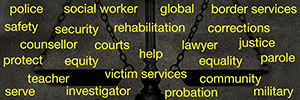- Future Students
- Current Students
- Faculty
- Staff
- Alumni
- Others
What’s it like to be wrongfully convicted?
Jamie Nelson spent 1,047 days in jail after being convicted of a crime he didn’t commit. During his time at the Millhaven Institution, a maximum-security prison, Nelson tried to hang himself, endured regular violence, and was powerless to stop as one of his sons was put up for adoption.
Nelson shared the ordeal – how it happened and how he was finally exonerated – with University of Guelph-Humber students as part of the third annual Wrongful Conviction Day, an event organized entirely by the student-run Justice Studies web page honours society Alpha Phi Sigma to explore the causes, remedies and consequences of wrongfully convicting innocent people.
“As future justice professionals, it is important to recognize the causes of wrongful convictions and how to avoid taking a course of action that unjustly removes someone’s freedom and forever impacts their life,” said Montana MacFarlane, vice-president of public relations for Alpha Phi Sigma.
As Nelson explained in his speech to a packed room of UofGH students, his experience in the justice system began when a friend of his estranged wife lodged a series of escalating claims of abuse against him during a custody battle. A chef by trade originally from Stratford, Ont., Nelson was first accused by this woman of physically assaulting her in 1994, before she accused him of another assault in 1996, and finally she told police that he brutally raped her the same year.
Nelson was convicted in part because of the same woman’s prior claims against him. As he explained in class, he was then forced to wait years in jail before being given the opportunity to appeal. While he waited, he was left to spend more than 14 months in isolation – or “in the hole” – in part because he opted to maintain his innocence and refused to take part in a sex-offender program.
“How do you defend yourself when you’re accused of a crime that never happened?” Nelson asked the students. “It’s daunting, let me tell you that. It’s the steepest mountain you could imagine. There are no handrails. There are no stairs. It was the hardest, steepest battle of my life.
“I knew I was innocent. My family knew I was innocent. And I would just have to move forward and demonstrate that.”
Ultimately, it turned out that Nelson’s accuser had accused dozens of others of similar crimes over the years. When his appeal date finally did come, the Ontario Court of Appeal reversed the verdict based on new evidence and in a matter of minutes, his years-long ordeal was over.
For students interested in pursuing employment in a variety of roles inside and around the justice system, Nelson’s talk was a stirring reminder of the personal cost that can result from shoddy or unethical prosecution.
“I was a police officer for 32 years before I came to academia and it pains me to hear Jamie’s story,” said Dr. Glenn Hanna, Assistant Program Head of Justice Studies at the University of Guelph-Humber. “My mantra was always that our job as police officers was to bring all the evidence to the door of the court, not to push for conviction. It was also the job of crown counsel to present all the evidence and to seek a just outcome.
“Some in the system can lose sight of those obligations and I think Jamie’s story will be part of my classes from now on as we discuss these topics.”
Certainly, Nelson’s experience resonated with students as well.
“Jamie is an amazing individual who is so passionate and open about talking about his experience,” MacFarlane said.
“He was more than happy to stay back after the presentation to shake hands with everyone, answer more questions and speak more in depth about certain aspects that he may not have covered in his presentation.”
Wrongful Conviction Day is just one opportunity offered by Alpha Phi Sigma, an honours society with a rich 75-year history in the United States.
First founded at Washington State University as an organization that helped students prepare for careers in law by encouraging academic achievement, leadership skills and an interest in social justice, Alpha Phi Sigma membership lasts a lifetime, so the professional networking opportunities continue even after students have graduated from UofGH.
“I have been a part of Alpha Phi Sigma for two years now and the connections and relationships I have in fourth year are incredible,” said MacFarlane. “Looking back at my university career, Alpha Phi Sigma is absolutely one of the highlights of my time here at the University of Guelph-Humber. I have relationships and connections whom I otherwise would not have connected with.
“The volunteer aspect and feeling as though I have contributed to my community has also been a life changer.”



